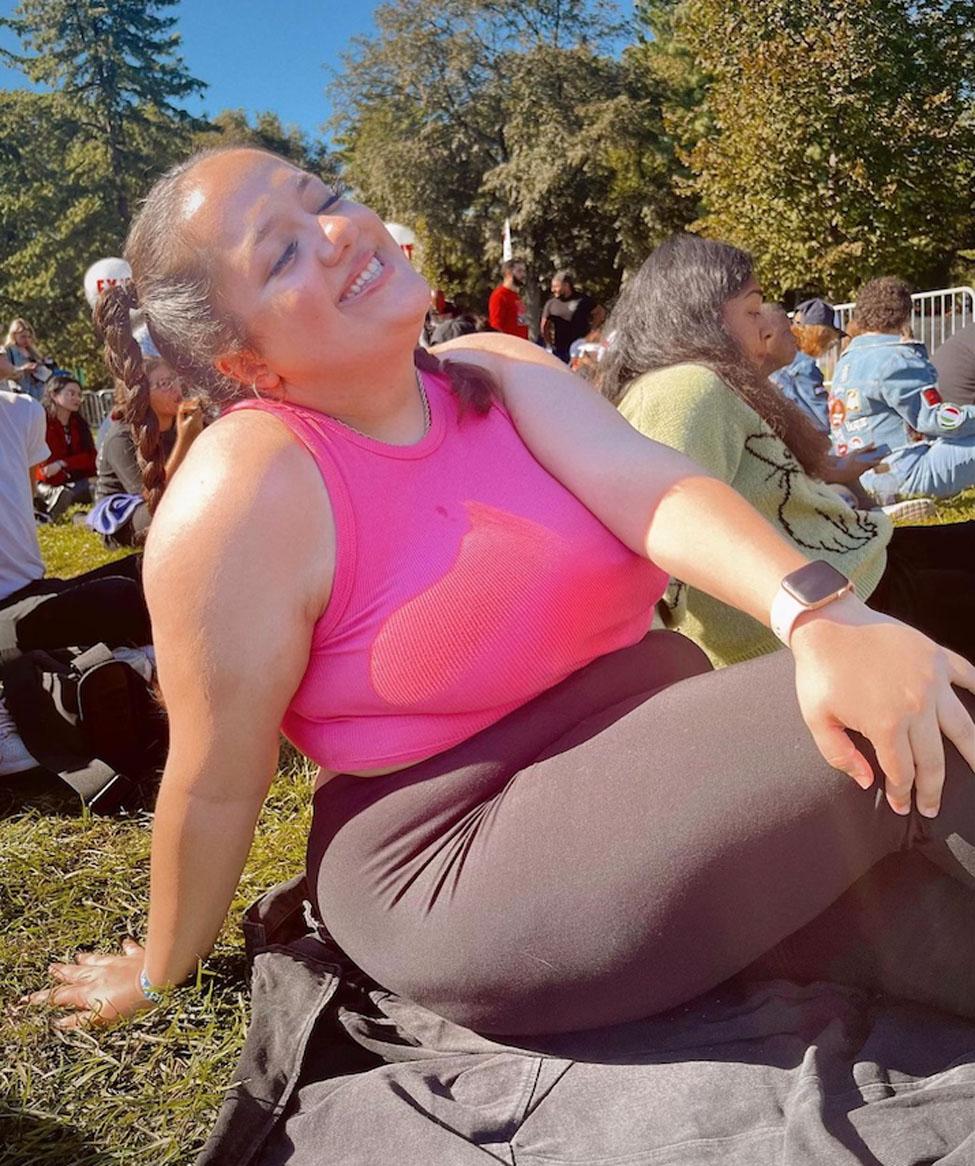
Haub Law Partners with Verizon on Street Law Pipeline Program for Local High School Students
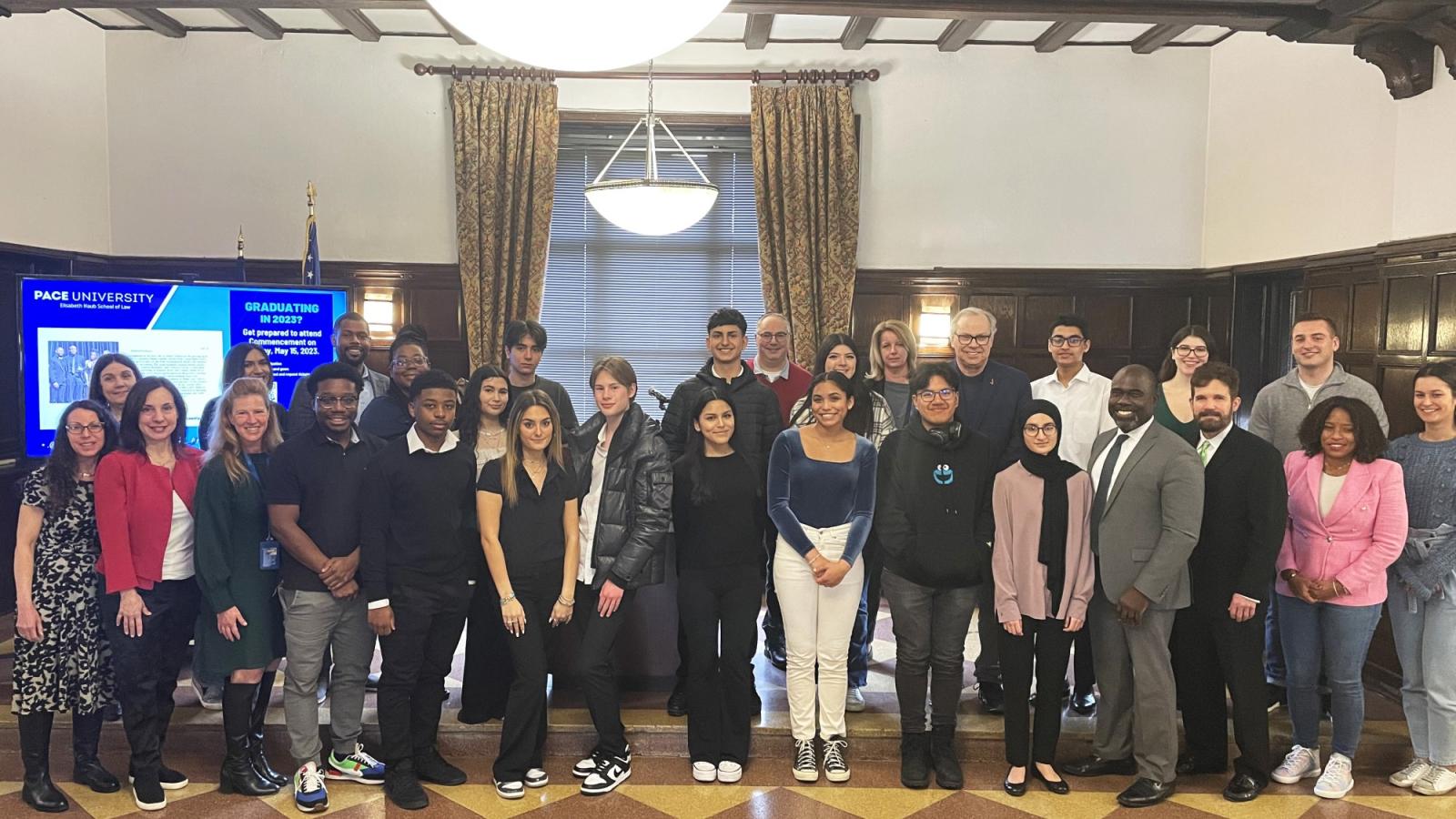
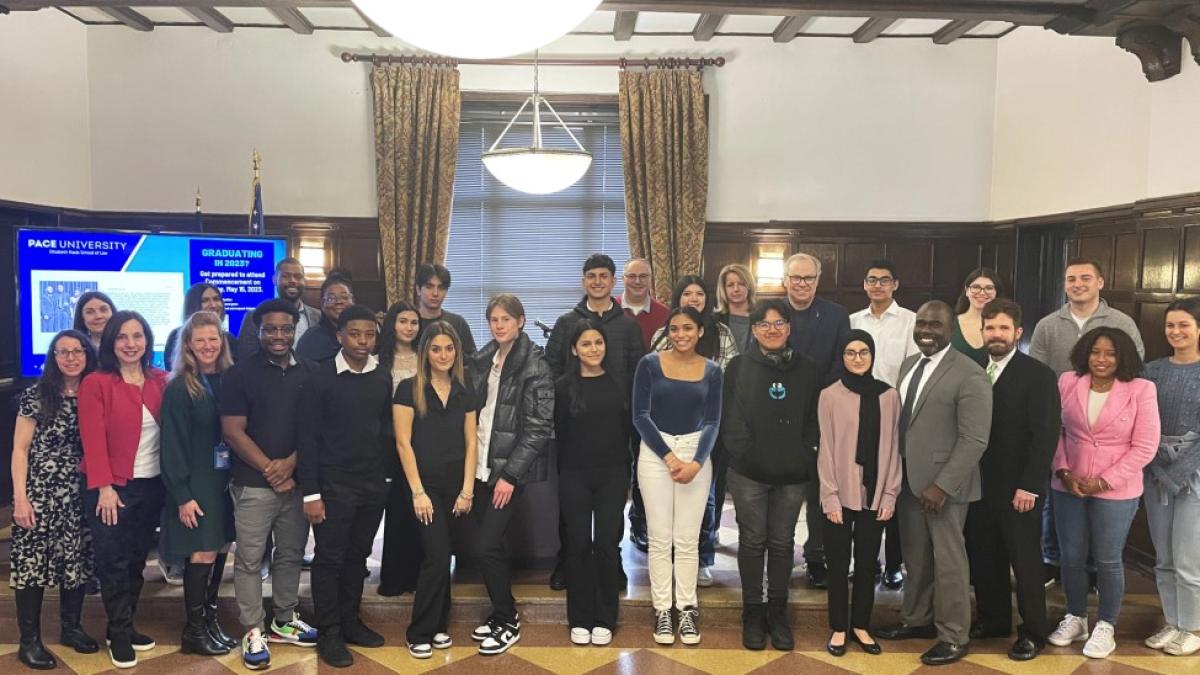
Students from the Elisabeth Haub School of Law at Pace University partnered with attorneys from Verizon to deliver its Street Law Legal Diversity Pipeline Program this year, a global program aiming to advance civic and law education to empower youth. The 4-part program included classroom workshops on law-related topics at New Rochelle High School, culminating with a full-day capstone experience at the law school.
The program was spearheaded by Haub Law alumnus Jerome {Jerry) Silber ’83, Vice President & Deputy General Counsel, Verizon Business Group, who, along with 6 volunteer attorneys from across Verizon’s vast legal department, has been running the Westchester County program for 5 years. Verizon currently supports Street Law in 11 cities and reached out to Haub Law to expand its Westchester program.
“Our partnership with Haub Law was a natural fit,” said Mr. Silber. “I’ve enjoyed reconnecting with my alma mater and the law students have been such an asset to our program. They bring a fresh perspective on the curriculum we’ve developed and are great role models for high school students. It has been a rewarding experience for all of us to teach young people in our community about the law and legal profession. Our goal is to provide a support system to help them get where they need to go.”
In coordination with Gary Weed, the host teacher from New Rochelle High School, 8 Haub Law students joined the Verizon attorneys to prepare and teach classes on Immigration Law, Advertising Law, and Search and Seizure to 20 students enrolled in a business law class. During the seminars, students examined different areas of the law and engaged in discussion and role playing, acting out scenarios such as reasonable search and seizure during a routine traffic stop based on the Fourth Amendment. They learned how to evaluate truthful vs deceptive advertisements and to determine what kind of immigration visa is required for different situations.
The class took a trip to the law school for the capstone event of the program, which included workshops where students prepared arguments on each topic and presented before a panel of judges. As part of the day’s agenda, students enjoyed a tour of the law school and casual career conversations with law students, faculty, and Verizon lawyers.
“I really enjoyed getting to work with the students and helping them work through very difficult material. Many of us were sitting where they are not long ago, so I think the participants saw us as a relatable resource and it made it easier for them to ask questions and for us to give career advice,” said 3L Kaitlin Campanini who participated in the program. “The program did a good job of demonstrating how relevant the law is in their everyday lives, even as high school students. Even if they don't pursue a career in law, it’s important to understand how the law might intersect in different areas of their lives.”
“Programs like this are so important to educate students to know and understand the law, and to be empowered to use it,” said Horace E. Anderson Jr., Dean of the Elisabeth Haub School of Law at Pace University. “We are thrilled to support partners like Verizon who share our commitment to addressing the dearth of diversity in the legal profession and who devote their energy on impactful ways that can improve access to justice in our community.”
Three Leaders in Business, Law, Technology and Finance Join the Elisabeth Haub School of Law’s Sustainable Business Law Hub Advisory Board
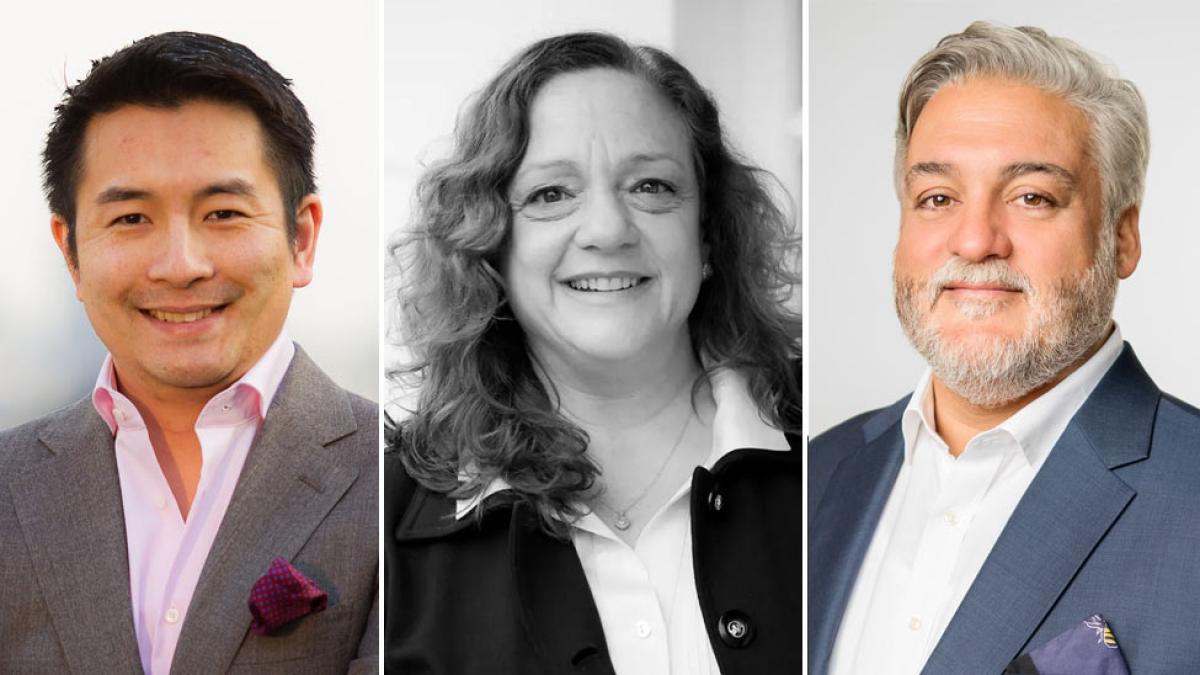
The Elisabeth Haub School of Law at Pace University is proud to welcome three prominent leaders in business, law, technology and finance as Advisory Board Members of the School’s recently launched Sustainable Business Law Hub. The new Advisory Board Members include Darryl Carbonaro, General Counsel of Generate Capital, PBC, Edward Ip, Founder and CEO of POS.com, and Donna Lanzetta, Founder and CEO of Manna Fish Farms, Inc. The Sustainable Business Law Hub’s Advisory Board consists of Haub Law faculty, esteemed alumni, prominent members of the legal community, entrepreneurs, and ESG and sustainability leaders.
“Our advisory board members are a key component of our Sustainable Business Law Hub,” said Kerlin Distinguished Professor of Environmental Law, Associate Dean for Environmental Law Programs and Strategic Initiatives, and the Faculty Director of the Sustainable Business Law Hub, Jason J. Czarnezki. “We are extremely fortunate to be surrounded and supported by experts in business, law, technology and finance who share the same goal as us: sustainability. Edward, Darryl, and Donna will help guide the Hub to the next level and make tangible and positive strides towards more companies having sustainable business models.”
Edward M. Ip is a serial entrepreneur with more than 20 years of experience in the retail, logistics, and healthcare technology sectors. He is the CEO of POS.com, a leading provider of point-of-sales systems, and recently founded a logistics startup on-track to process over 5 million packages annually. As a lifelong New Yorker, he lives with his wife and four kids while serving as a trustee at the Queens Botanical Garden and as an advisor and mentor to several organizations, including Pockyt and American Cancer Society New York Presbyterian Hospital Queens. Edward hopes to help transition different sectors toward a more sustainable future.
Darryl Carbonaro is committed to integrating technology and structured finance to create a more equitable world. He is the General Counsel of Generate Capital, PBC, in San Francisco, a leading sustainable investment and operating platform driving the infrastructure revolution. Darryl has more than 20 years of experience investing in all types of energy and infrastructure assets, including hydroelectric facilities along the Danube, wind farms in North Dakota and anaerobic digesters in Indiana. A former chemical engineer focused on downstream waste treatment technologies, Darryl began his legal career as a project finance lawyer at White & Case in New York, then moved to Dechert LLP in San Francisco to focus on securitization. He served as an assistant general counsel at Bank of America, where he helped launch the bank’s renewable energy finance and energy efficiency finance groups. Prior to joining Generate, Darryl was the deputy general counsel for a consumer finance company focused on residential energy solutions. Darryl earned a JD from the Elisabeth Haub School of Law at Pace University, and BS in Chemical Engineering from Drexel University.
Donna Lanzetta is an attorney and entrepreneur with a passion for sustainable seafood production. She is Founder and CEO of Manna Fish Farms, Inc., Manna Seafood Blockchain, Inc., Manna Systems, Inc., Manna Aquaculture Innovation Center, Inc., Manna at Lobster Inn Restaurant, and Manna Ocean Foundation, Inc. The Manna Fish Farms’ team and collaborators include experienced fish and oyster farmers, marine biologists and marine engineers, along with numerous educational institutions. The Manna Companies explore new models for ocean farming, integrating technology, automation, new feed compositions, and renewable energy into offshore farms and operations. Donna received her JD from the Elisabeth Haub School of Law at Pace University and her undergraduate degree in Business Marketing/Management from LIU-Southampton College, where she graduated Magna Cum Laude.
“Edward, Darryl, and Donna are all leaders and innovators in each of their respective fields,” remarked Horace Anderson, Dean of the Elisabeth Haub School of Law at Pace University. “Each of them has a unique perspective on the field of sustainability. We are grateful for the dedication of both their time and knowledge to our Sustainable Business Law Hub.”
Launched in fall 2021, Haub Law’s Sustainable Business Law Hub serves as an incubator space, student-training program, research endeavor, and think tank devoted to addressing global sustainability challenges through policy and research projects, relationships with the business community, and capacity building in private environmental governance. The Hub incorporates the three pillars of sustainability—economic, social and environmental welfare—into global business practices by engaging in research and policy development, improving public law and governance, and working with existing industry, the small business community, startups, and the community at-large to develop and employ innovative private environmental models and sustainability practices, such as those that promote a circular economy. Working hand-in-hand with faculty experts, students participating in the Hub receive practical training and experience in using the law to foster sustainable business practices.
In addition to the three news Members, the Sustainable Business Law Hub Advisory Board is comprised of the following leaders:
Anna Marciano Romanella (Haub Law ‘00), VP, Sustainability Zone North America Nestle, GC & Head of Sustainability, Nespresso USA
Colin Myers (Haub Law ’21), Associate (ESG), Paul, Weiss, Rifkind, Wharton & Garrison LLP
Anna-Sophia E. Haub, Sustainability & ESG Consultant, Schlange, Zamostny & Co. GmbH
Madhuri Pavamani, Sustainability & ESG Advisory Practice Director, Paul, Weiss, Rifkind, Wharton & Garrison LLP
Horace E. Anderson, Dean and Professor of Law, Elisabeth Haub School of Law
Jason J. Czarnezki, Gilbert and Sarah Kerlin Distinguished Professor of Environmental Law, Associate Dean and Executive Director of Environmental Law Programs, Faculty Director of Sustainable Business Law Hub, Elisabeth Haub School of Law
Achinthi C. Vithanage, Associate Director of Environmental Law Programs and Professor, Elisabeth Haub School of Law
Jonathan H. Brown, Director, Food and Beverage Law Clinic, Elisabeth Haub School of Law
Josh Galperin, Assistant Professor of Law, Elisabeth Haub School of Law
Learn more about the Sustainable Business Law Hub at the Elisabeth Haub School of Law at Pace University.
Elisabeth Haub School of Law at Pace University Honors Moldova’s Chief Prosecutor, Veronica Dragalin, with the Robert S. Tucker Prize for Prosecutorial Excellence
The Elisabeth Haub School of Law at Pace University honored Veronica Dragalin, Chief of the Anticorruption Prosecution Office for the Republic of Moldova, with its 2023 Robert S. Tucker Prize for Prosecutorial Excellence at a ceremony in New York City attended by fellow prosecutors and other members of the legal community. Veronica, a former Assistant United States Attorney, was recognized for her outstanding contributions to the field of criminal prosecution and excellence in prosecutorial practice, and praised for her commitment and courage in leading the fight against corruption in her native country of Moldova.
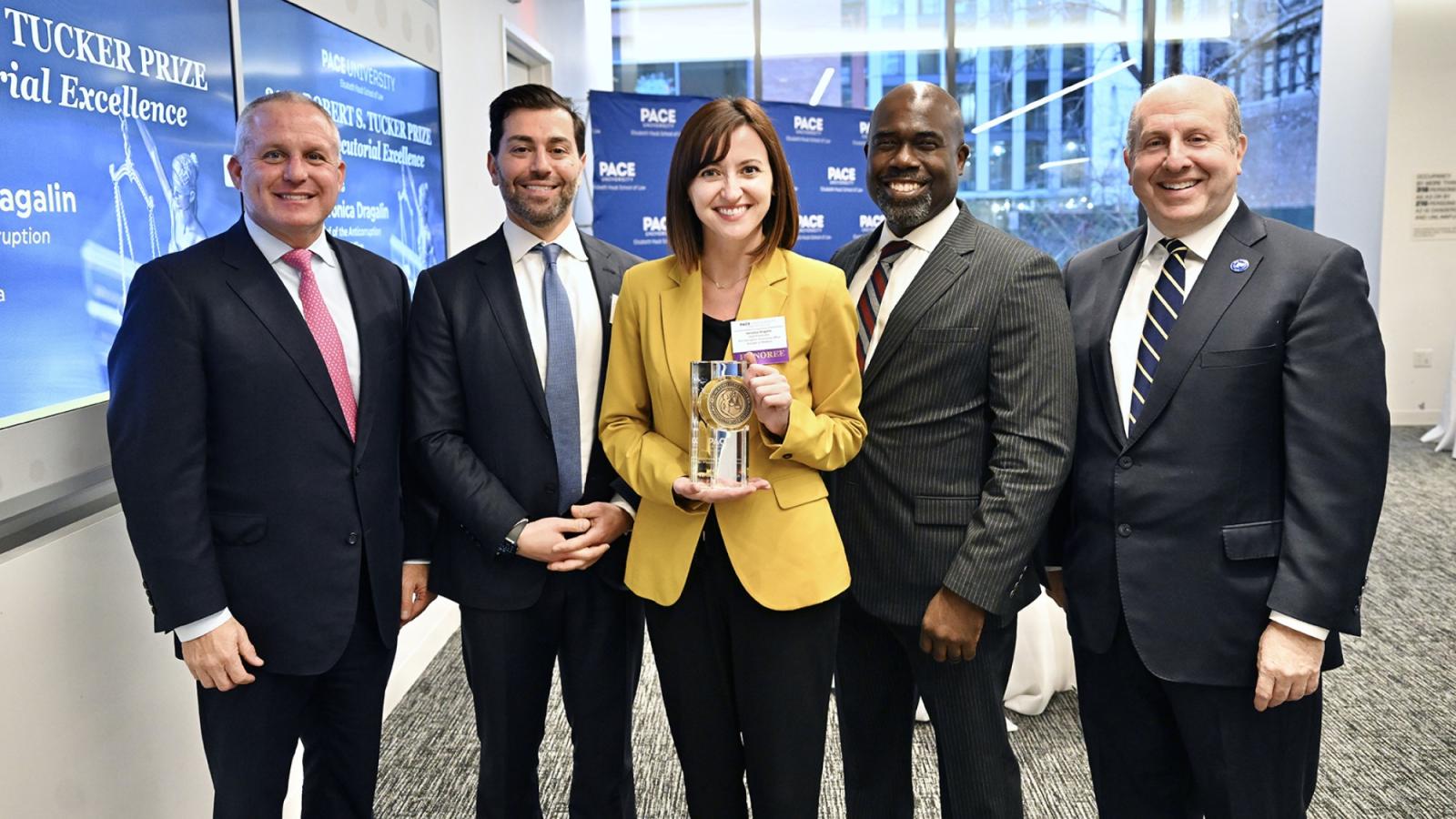
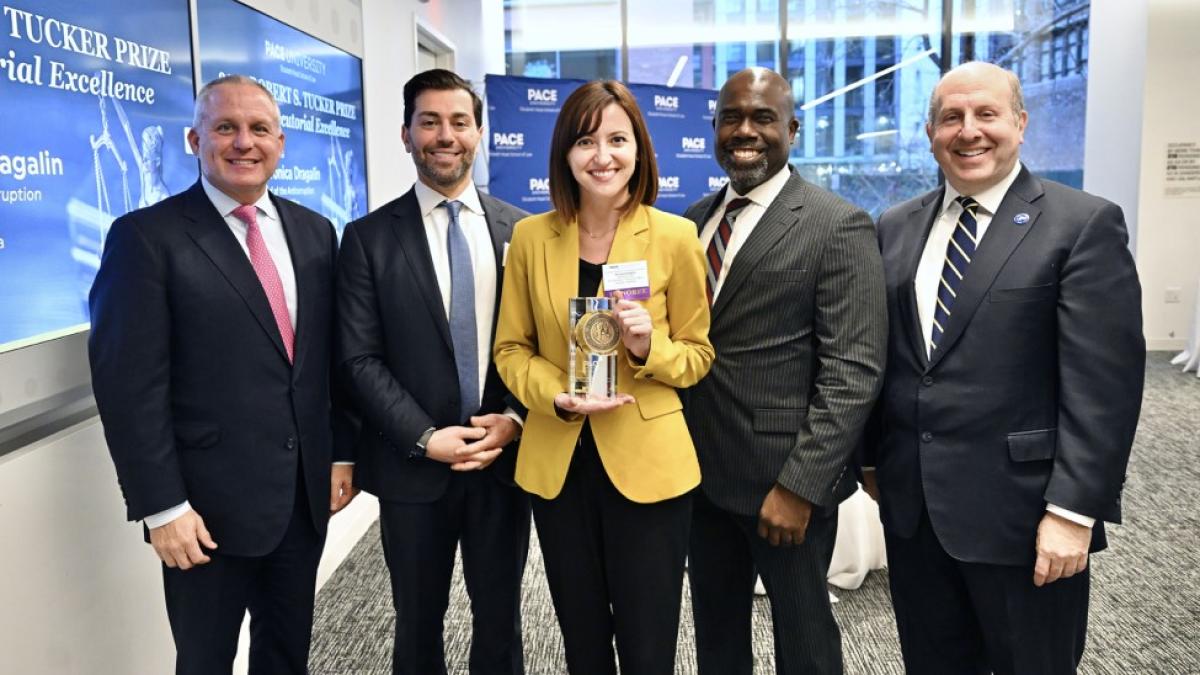
The Elisabeth Haub School of Law at Pace University honored Veronica Dragalin, Chief of the Anticorruption Prosecution Office for the Republic of Moldova, with its 2023 Robert S. Tucker Prize for Prosecutorial Excellence at a ceremony in New York City attended by fellow prosecutors and other members of the legal community. Veronica, a former Assistant United States Attorney, was recognized for her outstanding contributions to the field of criminal prosecution and excellence in prosecutorial practice, and praised for her commitment and courage in leading the fight against corruption in her native country of Moldova.
Veronica is a dual citizen born and raised in the Republic of Moldova and educated in the United States. Assistant United States Attorney Adam Schleifer, a friend and former colleague, introduced Veronica and highlighted her distinguished career. He spoke of her unique journey to find her passion as a successful prosecutor in the U.S.—fulfilling the American dream and now giving all she’s received back into the world for the greater good. “She has gone way above and beyond the call of duty, taking on the role at great risk to her life,” Adam said.
During the presentation of the award, benefactor Robert S. Tucker, CEO of T&M USA, LLC, spoke of the critical importance of the rule of law and of the fundamental principle that “no man is above the law.”
“These words are the compass for all great prosecutors past and present, and especially for the one we are honoring here today,” said Mr. Tucker. “In these fraught times, the role of the prosecutor is more vital than ever. And more than ever it takes courage and resolve to uphold the rule of law.”
Veronica left Moldova at the age of 8, eventually coming to the U.S. as a teenager and receiving an undergraduate degree from Duke University and a JD degree from the University of Virginia School of Law. She spent the first years of her career as an associate at the international law firm, Jones Day. After working as a lawyer on civil litigation and international criminal investigations, in 2016, Veronica became a federal prosecutor in Los Angeles where she worked in the Public Corruption & Civil Rights Section and served as the office’s Hate Crimes Coordinator. Veronica tried ten jury trials as a prosecutor and charged more than 50 cases, including against federal and local law enforcement officers for civil rights violations as well as public officials for bribery and other corruption crimes, including a RICO conspiracy case charging Los Angeles City Councilmembers, a Deputy Mayor, and other public officials and individuals involved in a pay-to-play scheme.
On August 1, 2022, Veronica began her current mandate as the Chief of the Anticorruption Prosecution Office for the Republic of Moldova, taking on the challenging role for a country with a long history of systemic political corruption at an especially turbulent time in the region. Her office of approximately 130 personnel currently handles criminal corruption investigations and prosecutions against high-level officials, including the ex-President, the suspended Prosecutor General, members of parliament, judges, and prosecutors.
Veronica is already making an impact in her new role within a short time. According to Transparency International’s 2022 Corruption Perceptions Index (CPI) published in January 2023, Moldova’s score has increased by three points, one of the most significant improvements made, placing it at 91 out of 180 countries in the CPI. The CPI ranks countries annually “by their perceived levels of public sector corruption, as determined by expert assessments and opinion surveys.”
“Veronica’s impressive career demonstrates her commitment to the pursuit of justice and embodies the values that we aim to instill in our students,” said Dean Horace E. Anderson Jr. “We are thrilled that she joined us in New York to honor her career, and thankful to both her and Adam for also sharing their time as guest lecturers at the law school. They are both truly inspiring examples for our students.”
The Robert S. Tucker Prize for Prosecutorial Excellence is awarded annually to an individual or a group of individuals who have made outstanding contributions to the field of criminal prosecution and who demonstrate excellence in prosecutorial practice. Honorees are selected each year by a jury comprised of former prosecutors and faculty members from the Elisabeth Haub School of Law at Pace University. The award ceremony brings together prosecutors from across the region and state, civic leaders, members of the judiciary, New York City government and the Haub Law community to recognize these distinguished individuals for their work. The prize is made possible by the generous support of Haub Law alumnus and Pace University Board of Trustees member Robert S. Tucker. Past Award Recipients include Bronx District Attorney Darcel D. Clark and the Office of the Bronx District Attorney, Brooklyn District Attorney Eric Gonzalez, former New York Attorney General Barbara Underwood, and Richard A. Brown, the late Queens District Attorney.
Haub Law Hosts Inaugural Equity & Justice Forum Featuring Marcia Sells, Chief Diversity Officer, Metropolitan Opera
On Monday, March 20, the Elisabeth Haub School of Law at Pace University presented their annual Inaugural Equity & Justice Forum. Marcia Sells, Chief Diversity Officer, Metropolitan Opera, was the featured panelist for this inaugural forum titled, “Belonging – Centuries of Struggle,” which highlighted the challenges of diverse communities in the legal profession. The forum was moderated by Haub Law Professor and Director of Diversity, Equity, and Inclusion, Barbara Atwell.

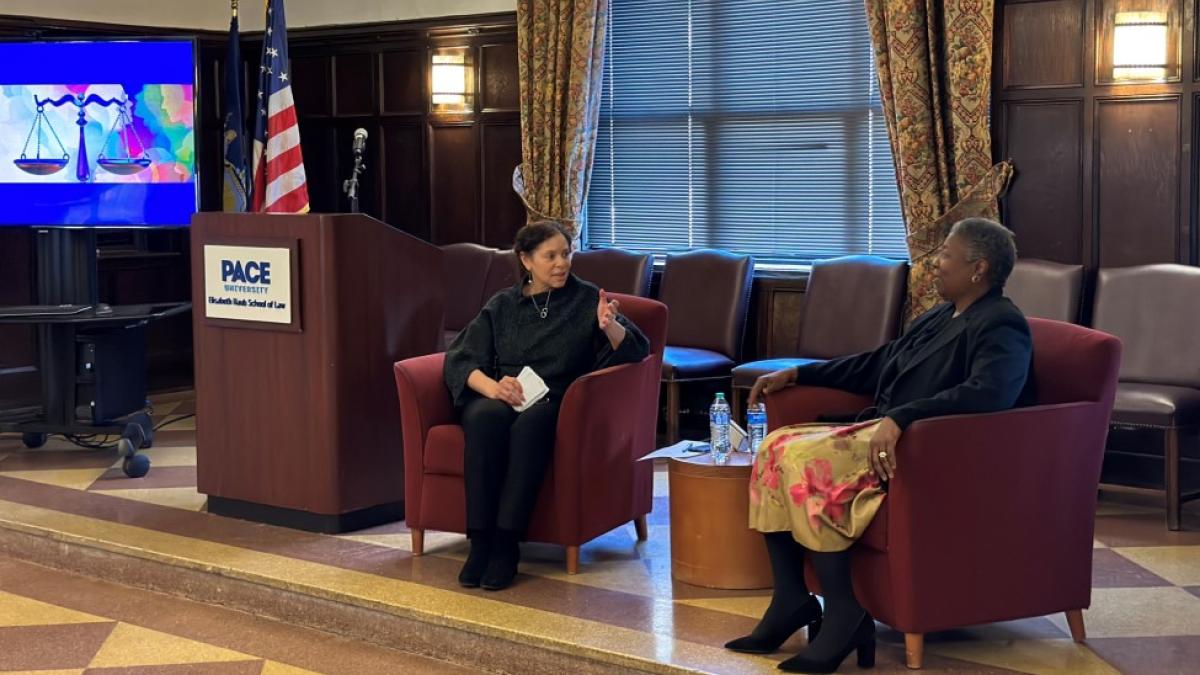
On Monday, March 20, the Elisabeth Haub School of Law at Pace University presented their annual Inaugural Equity & Justice Forum. Marcia Sells, Chief Diversity Officer, Metropolitan Opera, was the featured panelist for this inaugural forum titled, “Belonging – Centuries of Struggle,” which highlighted the challenges of diverse communities in the legal profession. The forum was moderated by Haub Law Professor and Director of Diversity, Equity, and Inclusion, Barbara Atwell.
In his introduction, Dean Horace E. Anderson, Jr. said, “We here at Haub Law are deeply committed to advancing racial and social justice in our community and more broadly throughout the world.” Dean Anderson noted Haub Law’s expanded social justice curriculum, its recently launched Access to Justice project, expanded pipeline and pathway programs, and more. He spoke of the importance of using conversations such as this as a way to reflect, evaluate and then effect further change, which is the purpose behind the Equity & Justice forum which will be an annual event at the law school, among other related events and programming.
Marcia Sells was appointed the first Chief Diversity Officer for the Metropolitan Opera in 2021. In this role for the largest performing arts institution in the nation, Marcia leads the development of diversity initiatives designed to address inequities in the art world and create a more inclusive workplace that values the diversity of its staff and the audiences it serves.
During the forum, Marcia spoke about her upbringing, her background as a ballerina, her law school experience, and the evolution of her career. The conversation between Professor Atwell and Marcia evolved into speaking not just about diversity, equity, and inclusion, but the greater sense of “belonging.” Marcia noted that, “Belonging has always been there,” but the crux of belonging now is, “how do we actually create as a community true space and acceptance?” The enlightening and engaging conversation, was followed by a Q&A session, which concluded with Marcia’s remarks that “We all have the right and responsibility to find that thing we do really, really well and go out there and do that.” A reception followed the event.
Prior to her current position, Marcia Sells held senior leadership positions in higher education, as Associate Dean and Dean of Students at Harvard Law School, at Columbia University where she had the dual-title of Associate Dean in the School of the Arts for Outreach & Education and Associate Vice President, Program Development & Initiatives, for the Office of Government and Community Affairs. Marcia also served as Dean of Students at Columbia University School of Law. Marcia’s varied work experiences have also included positions in the private and public sector for Reuters America, the National Basketball Association, and as Assistant District Attorney trying rape and child abuse cases for the Kings County District Attorney’s Office. Before going to college at Barnard and earning her law degree at Columbia Law School, Marcia began life in the arts as a ballerina in the Dance Theatre of Harlem and Cincinnati Ballet.
Haub Law Dean Horace Anderson Named to Westchester County Association Board of Directors
Horace E. Anderson Jr., Dean of the Elisabeth Haub School of Law at Pace University, has been named to the Board of Directors of the Westchester County Association (WCA).
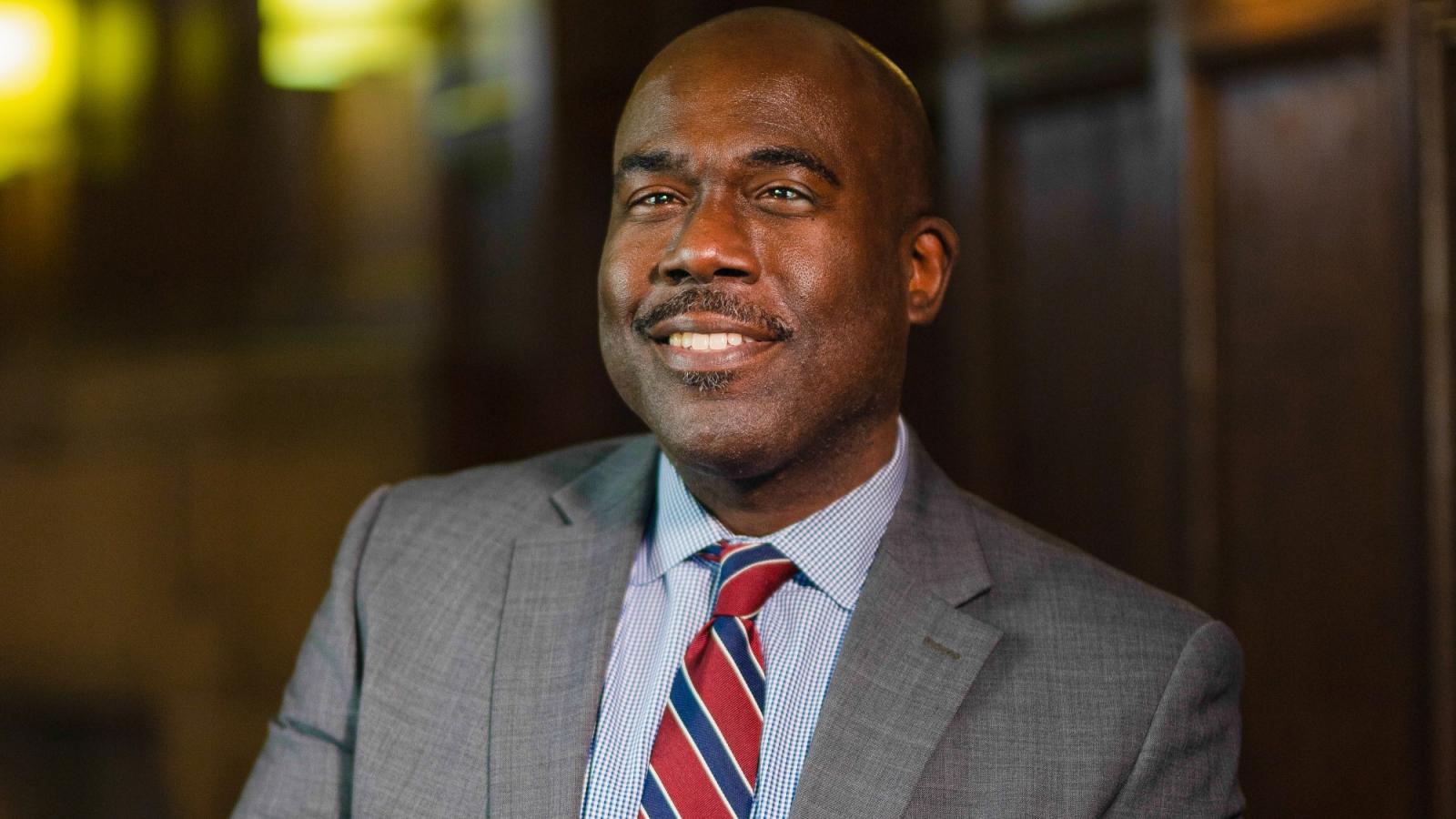
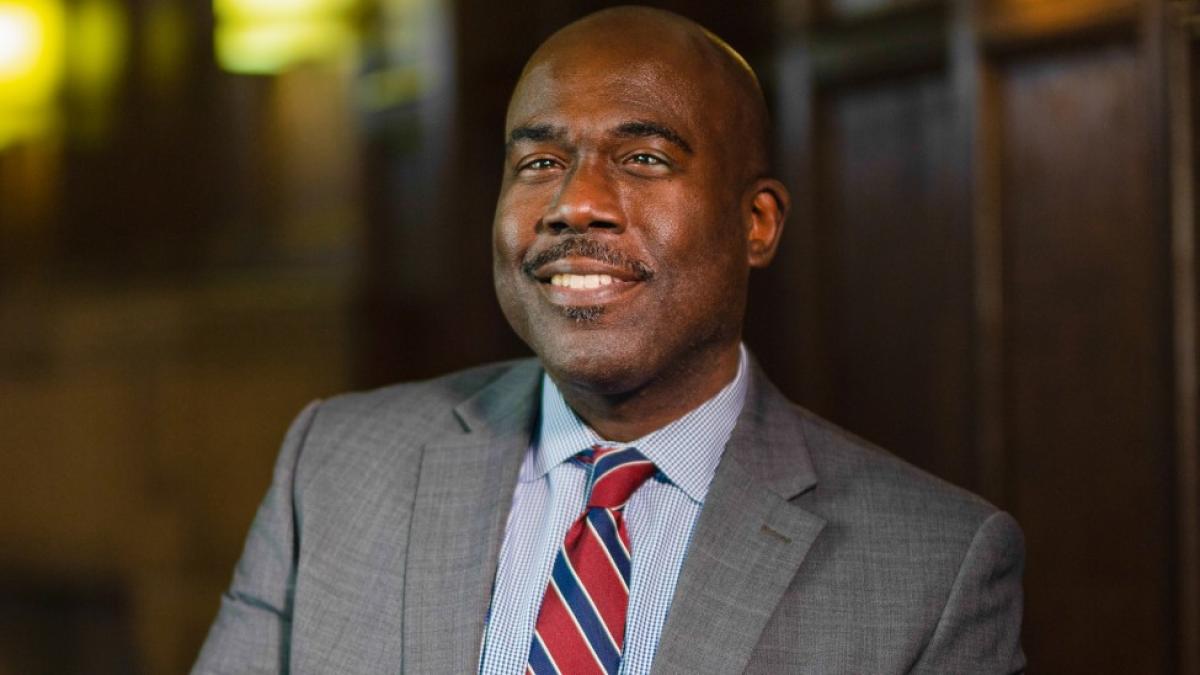
Horace E. Anderson Jr., Dean of the Elisabeth Haub School of Law at Pace University, has been named to the Board of Directors of the Westchester County Association (WCA).
Dean Anderson’s appointment is a reflection of the long-standing partnership between the Law School and the WCA on policy and programming, including collaborations with its Land Use Law Center and Energy and Climate Center. Together, they launched the Clean Energy Program Portal, which was recognized by Westchester County last year at its 3rd annual ECO Awards. Among its most recent collaborations, Haub Law hosted the inaugural WCA Sustainable Business Conference, bringing together environmental law faculty and alumni experts with thought leaders from across the state to discuss ESG concepts, policy and innovations in business sustainability.
“As leader of an important educational institution located in the county, I am proud to have an opportunity, through service on WCA’s board, to contribute to the success of the business and nonprofit community in Westchester, and to the growth of the regional economy,” said Dean Anderson. “The law school and WCA have forged several successful collaborations over the years. We are excited to continue providing the ideas, expertise and energy of our students, faculty and staff – especially in the vital areas of sustainable business development, renewable energy, land use, and healthcare.”
“The reason the WCA can be so effective on issues that drive regional economy is because leaders like Dean Anderson step up and serve on our board,” said Michael N. Romita, President & CEO, Westchester County Association. “In his tenure at the Pace University Elisabeth Haub School of Law, Horace has already made invaluable contributions to our sustainability initiatives. We are fortunate to have his thoughtful expertise on our board and look forward to our continued partnership with his new role.”
As the preeminent business membership organization in Westchester County, the WCA is committed to business advocacy, economic vitality and to providing a strong and clear voice for the interests of businesses on the regional, national and international levels. The WCA represents professionals in real estate, healthcare, finance & banking, hospitality, technology and other professional services; as well as municipalities, nonprofit organizations and institutions of higher education – supporting their objectives through direct advocacy and original programming.
Environmental Law Scholar, Lisa Benjamin, Selected to Receive 2022–2023 Pace | Haub Environmental Law Distinguished Junior Scholar Award
The Elisabeth Haub School of Law at Pace University is proud to announce that Professor Lisa Benjamin has been selected to receive the 2022–2023 Pace |Haub Environmental Law Distinguished Junior Scholar Award. The Haub Environmental Law Distinguished Junior Scholar Award is presented annually to an emerging junior environmental law professor who exhibits scholarly excellence and promise at an early stage in his/her career. The Haub Environmental Law Faculty solicits nominations from law professors throughout the country and selects a recipient from that pool of nominations. The award recipient is invited to present his/her recent scholarship to the Haub Law community.
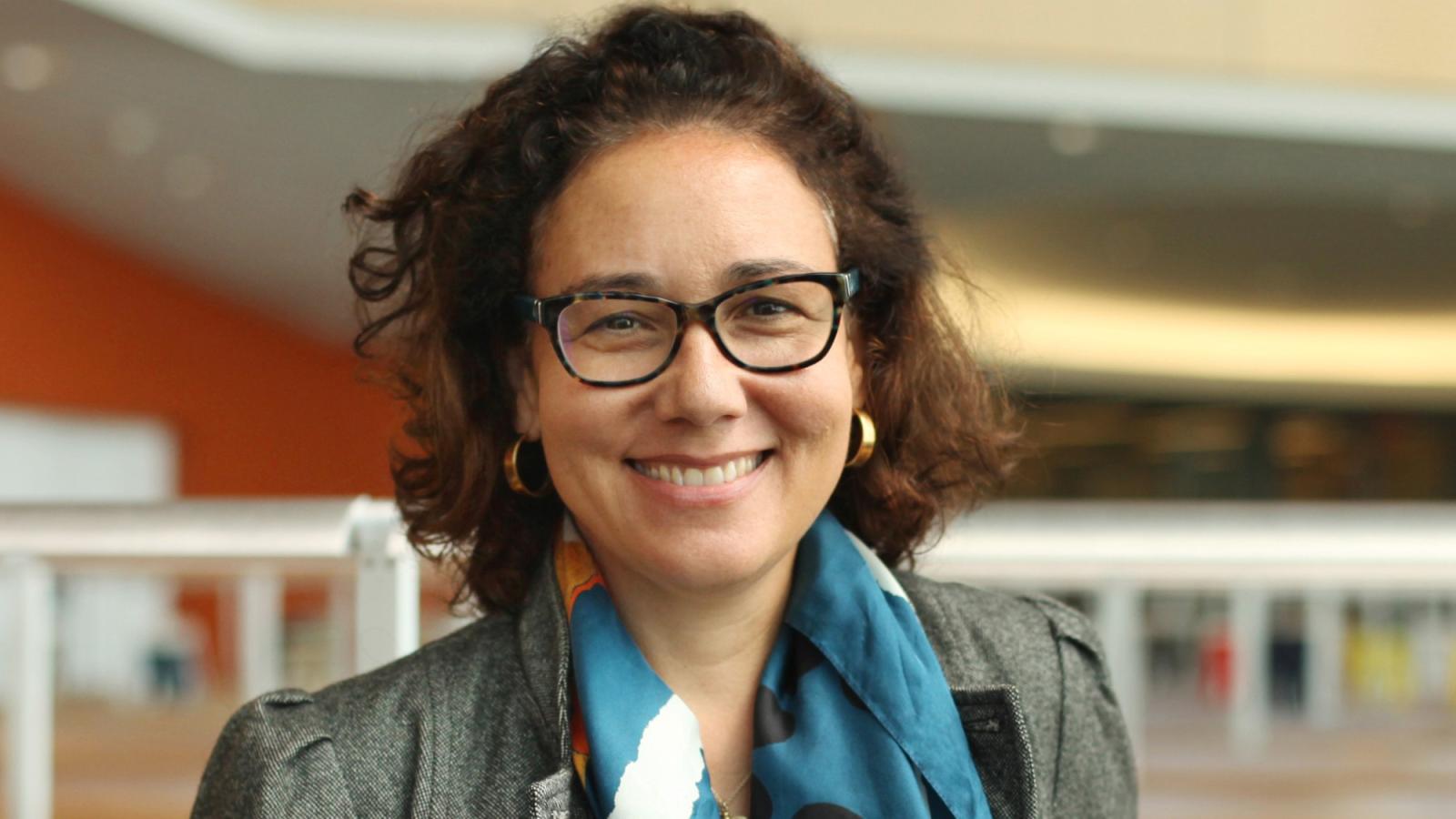
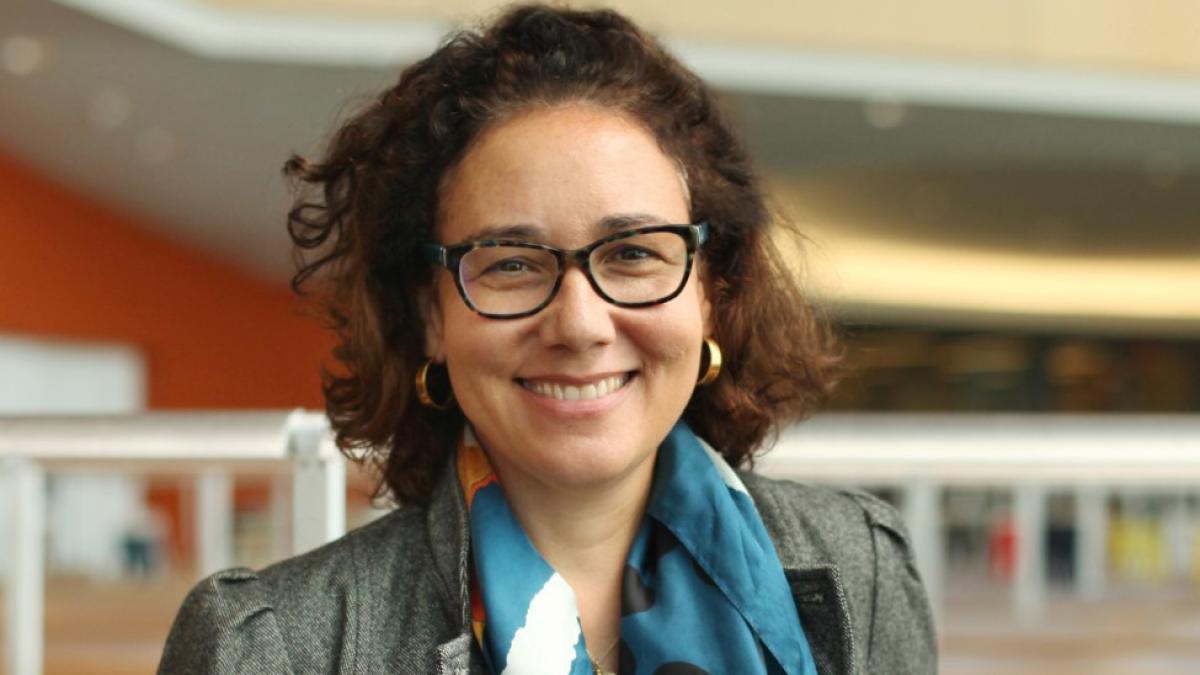
The Elisabeth Haub School of Law at Pace University is proud to announce that Professor Lisa Benjamin has been selected to receive the 2022–2023 Pace |Haub Environmental Law Distinguished Junior Scholar Award. The Haub Environmental Law Distinguished Junior Scholar Award is presented annually to an emerging junior environmental law professor who exhibits scholarly excellence and promise at an early stage in his/her career. The Haub Environmental Law Faculty solicits nominations from law professors throughout the country and selects a recipient from that pool of nominations. The award recipient is invited to present his/her recent scholarship to the Haub Law community.
Professor Lisa Benjamin is an Associate Professor of Law at Lewis & Clark Law School in Portland Oregon. Her research focuses on climate justice and climate risk, and how these issues intersect with energy law and administrative law. “Professor Lisa Benjamin has unique experience working in climate justice and climate risk,” said Professor Katrina Kuh, Haub Distinguished Professor of Environmental Law. “Her deep research on energy and climate justice and participation in international climate negotiations is the type of thought leadership and action that we look for when selecting Haub Law’s junior scholar.”
Professor Benjamin is a widely published scholar and has written a book and several articles and book chapters on non-state actors and climate risk, as well as energy and climate justice in developing countries, including small island developing states. Her book is titled “Companies and Climate Change: Theory and Law in the United Kingdom,” and her scholarship has been published in Transnational Environmental Law, Loyola Law Review, Utah Law Review, among many others. She is also the Vice Chair of the UNFCCC Compliance Committee (Facilitative Branch), a Director of Verde PDX (an environmental justice NGO), co-Chair of the Climate Accountability working group of the Climate Social Science Network, and a member of the Expert Peer Review Group in the Race to Zero campaign (a UN-backed global campaign to rally leadership and support from businesses, cities, regions, investors for a healthy, resilient, zero carbon recovery). Previously, she was the legal advisor to The Bahamas during the UNFCCC Paris Agreement negotiations.
“It is an honor to receive the 2022–2023 Pace | Haub Environmental Law Distinguished Junior Scholar Award,” said Professor Lisa Benjamin. “I am delighted to be recognized as an emerging scholar by the number one Environmental Law program in the United States. It is an incredible privilege to follow in the steps of such accomplished previous recipients. I am eager to share my scholarship and present my work at Haub Law.”
Professor Benjamin received her BA from McGill University, her LL.B. from the University College London, her LLM from University of London, and her PhD from the University of Leicester. Last year’s Distinguished Junior Scholar award recipient was Vanessa Casado Pérez, Associate Professor of Law, and Dean’s Research Chair at Texas A&M School of Law.
“We are proud to designate Professor Benjamin as our 2022–2023 Environmental Law Distinguished Junior Scholar Award,” said Jason Czarnezki, Gilbert and Sarah Kerlin Distinguished Professor of Environmental Law and Associate Dean of Environmental Law Programs and Strategic Initiatives. “The Haub Law community will benefit tremendously from learning more about Professor Benjamin’s innovative research in the areas of climate justice and climate risk.” Professor Lisa Benjamin will deliver a presentation to the Haub Law community in Fall 2023.
Professor Andrea Kupfer Schneider Discusses Arbitration During the 2023 Philip B. Blank Memorial Lecture on Attorney Ethics
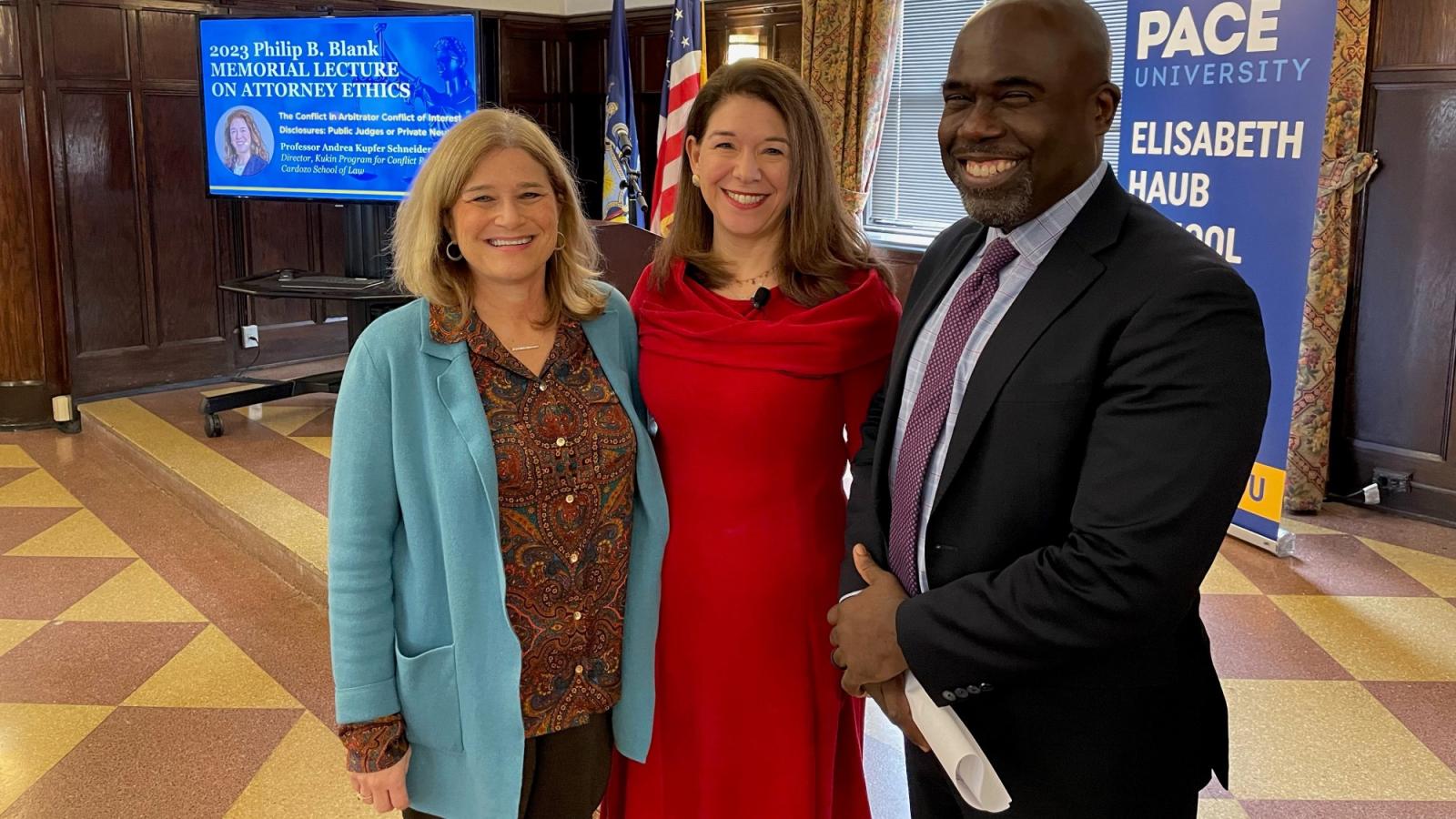
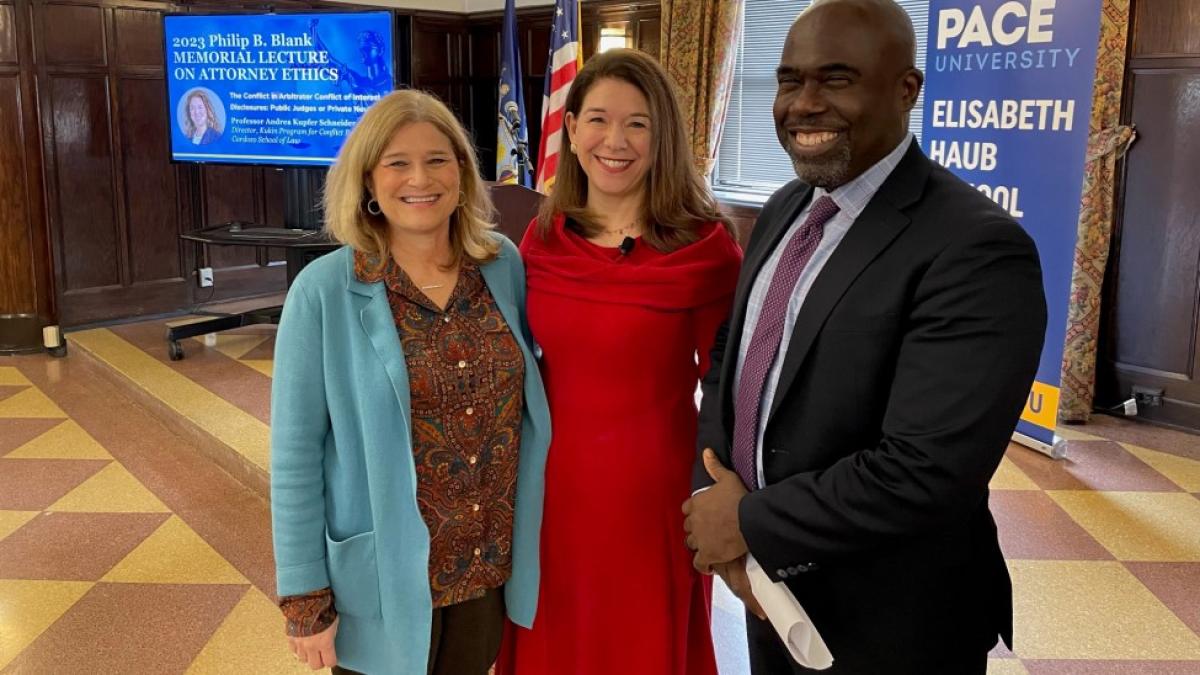
Professor Andrea Kupfer Schneider, Director of the Kukin Program for Conflict Resolution at Cardozo School of Law, Yeshiva University, delivered the 2023 Philip B. Blank Memorial Lecture on Attorney Ethics on Wednesday, March 1, speaking on "The Conflict in Arbitrator Conflict of Interest Disclosures: Public Judges or Private Neutrals?" The Philip B. Blank Memorial Lecture on Attorney Ethics was established by the family, friends and colleagues of the late Philip B. Blank, Associate Dean for External Affairs and Professor of Law at Pace University School of Law. In honor of Dean Blank's commitment to legal ethics, the Blank Lecture has presented distinguished members of the legal community recognized for their leadership in the area of attorney ethics and practice.
Elisabeth Haub School of Law Dean Horace E. Anderson Jr. gave welcoming remarks and had the pleasure of introducing Professor Andrea Kupfer Schneider. Dean Anderson noted that Professor Schneider is a “renowned professor, scholar and lecturer specializing in negotiation, plea bargaining, negotiation pedagogy, ethics, gender and international conflict.”
During her insightful lecture, Professor Schneider started by explaining to the audience that “Arbitration is ubiquitous. It is everywhere, so we really should pay attention to what is going on.” She focused on the role of the arbitrator, who is a private decision-maker substituted for a public judge, and how our legal system ensures that arbitrators are neutral to maintain justice. She posed three critical questions: At what point in the arbitration process do we ensure justice? Who is the best actor to enforce justice in arbitration? And, what is the best ethical standard we should use to guarantee arbitrator neutrality?
Professor Schneider then reviewed the current standards of neutrality under both the Federal Arbitration Act (“evident partiality” could lead to vacatur of an award) and various forum rules, which focus on pre-hearing disclosure of circumstances that create even an appearance of bias. She demonstrated how these standards do not always lead to an arbitration panel without bias or an appearance of bias. In terms of reform, Professor Schneider stated that, in part because “courts have been absolutely reluctant to rule on disqualification,” revising the Act to provide clear language would be best. “An amendment that gives courts the ability to review or step in earlier in the arbitration process to ensure that the neutrals are the right neutrals in the first place would likely be the best option for reform,” said Professor Schneider.
Professor Schneider is the Director of the Kukin Program for Conflict Resolution at Cardozo School of Law, Yeshiva University. Previously, she was director of the nationally ranked ADR program at Marquette University Law School for over two decades, where she was also the inaugural director of the university’s Institute for Women’s Leadership. She has been the recipient of numerous awards including the Woman of the Year Award by the Wisconsin Law Journal and the Association for Women Lawyers. She also received the ABA Section of Dispute Resolution Award for Outstanding Scholarly Work, the highest scholarly award given by the ABA in the field of dispute resolution. Additionally, Professor Schneider is prolific author, with many articles and textbooks to her credit, including most recently Dispute Resolution: Beyond the Adversarial Model (with Carrie Menkel-Meadow, Lela Love and Michael Moffitt) now in its third edition. She regularly presents her work and provides negotiation trainings around the world. Among her many leadership roles, Professor Schneider is a founding editor of Indisputably, the blog for ADR law faculty, and the founder of the Dispute Resolution Works-in-Progress annual conference. Professor Schneider received her A.B. cum laude from Princeton University’s School of Public and International Affairs and her J.D. cum laude from Harvard Law School. She also received a Diploma from the Academy of European Law in Florence, Italy.
Following the lecture, law students, faculty and guests had an opportunity to ask questions during a Q&A session led by Haub Law Professor Jill Gross, an expert in dispute resolution and arbitration, along with an arbitrator for the American Arbitration Association. Many questions focused on the opportunity for reform in arbitration, with Professor Schneider noting that, “The interesting thing to me in tracking arbitration legislation is that there have been so many attempts in Congress for reform. I think that there could be a bipartisan agreement to give states more power or back some power.”
Past Blank lectures were delivered by various distinguished experts and academics in the area of Attorney Ethics and Practice, including most recently, Irene Oritseweyinmi Joe, Professor of Law, UC Davis School of Law, Mimi Rocah, Westchester County District Attorney, and others.
Big City Dreams and The Sound of Success
For Katie Stephens '23, working in the music industry has been a lifelong dream. Luckily, she's on the right path to fulfilling that dream. Not only will Katie graduate in May 2023 with her BBA in Arts and Entertainment Management, but she's also the Marketing Director for Pace Music Group and a representative for Warner Music U, proving that she's on her way to a successful career in the industry.

Katie Stephens
Social Media & Fan Engagement Coordinator, MTV Paramount
Class of 2024
BBA in Arts and Entertainment Management with minors in Digital Marketing and Law
Member Of: Pace Music Group
Pronouns: She/Her/Hers

For Katie Stephens, working in the music industry has been a lifelong dream. Luckily, she's on the right path to fulfilling that dream. Not only will Katie graduate in May 2023 with her BBA in Arts and Entertainment Management, but she's also the Marketing Director for Pace Music Group and a representative for Warner Music U, proving that she's on her way to a successful career in the industry.
Why did you choose Pace University and the Lubin School of Business?
Growing up in a small town in Louisiana, I knew I wanted to go to a big city like New York City, but I also wanted a community. Pace University provides both of those opportunities.
How have clubs on campus helped enrich your student experience?
I was an active member of the Industry Network during my freshman year. I am now the Marketing Director of Pace Music Group. Both organizations have helped me grow my network and have given me a sense of community!
The Lubin School of Business is giving me the resources I need in order to learn about the music industry while also connecting me with real-life opportunities to learn (i.e., events, concerts, volunteer work). Since Pace is on the smaller side, as well, I have been able to connect with alumni who were once in my shoes, which has helped me get hired at two of my internships!
How is the Lubin School of Business helping you achieve your dreams of working in the music industry?
The Lubin School of Business is giving me the resources I need in order to learn about the music industry while also connecting me with real-life opportunities to learn (i.e., events, concerts, volunteer work). Since Pace is on the smaller side, as well, I have been able to connect with alumni who were once in my shoes, which has helped me get hired at two of my internships!
You serve as a representative for Warner Music U. How have your business classes helped you succeed in this role?
My marketing courses have helped me learn different marketing strategies. Event Management (MGT 312) has helped me a ton with designing and planning the events that I'm required to throw on campus. Next to that, I would not understand most of the industry terminology that I do now if it weren't for the "How the Entertainment Industry Works" course with Professor Paul Guzzone.
What has been your favorite opportunity at Pace?
My favorite opportunity so far has been planning and hosting the End of Year Showcase with Pace Music Group. We brought in a professional artist to headline and gave Pace students the opportunity to open for them.
Do you have any advice for other Lubin students?
Ask questions! Network with your peers! Network at off-campus events (go to a concert and introduce yourself to the tour manager, merch people, etc.) and be active on campus! Companies want to see you involved in more than just work-related activities and events.
What does #LubinLife mean to you?
#LubinLife means community. I've had so many Pace alumni help me with interviews and resume reviews, and I strive to do that for other students! I'm very fortunate to have landed the positions that I have, and I want to make sure other Lubin students have the resources and knowledge they need to land the positions they want!
Connect with Katie:
Harold E. Kaplan ’72, ‘83: Giving Back to the Pace Community
Harold E. Kaplan is a dual degree graduate of Pace University, having received his BBA in 1972 from Pace University, and his JD in 1983 from what was then known as Pace Law. After spending years in hospital administration, Harold reached out to former Pace University President Edward Mortola and began seriously considering law school. Three years later, in 1980, Harold began his law school journey and then in 1983, he graduated and was admitted to the NY Bar, prepared well by the Law School to start his career as a health law attorney. Over the years, Harold has been a generous supporter of both Pace University and the Elisabeth Haub School of Law at Pace University. Most recently, he endowed a scholarship, the Harold E. Kaplan Health Law and Policy Scholarship, to support students who are passionate about Health Law and Policy.
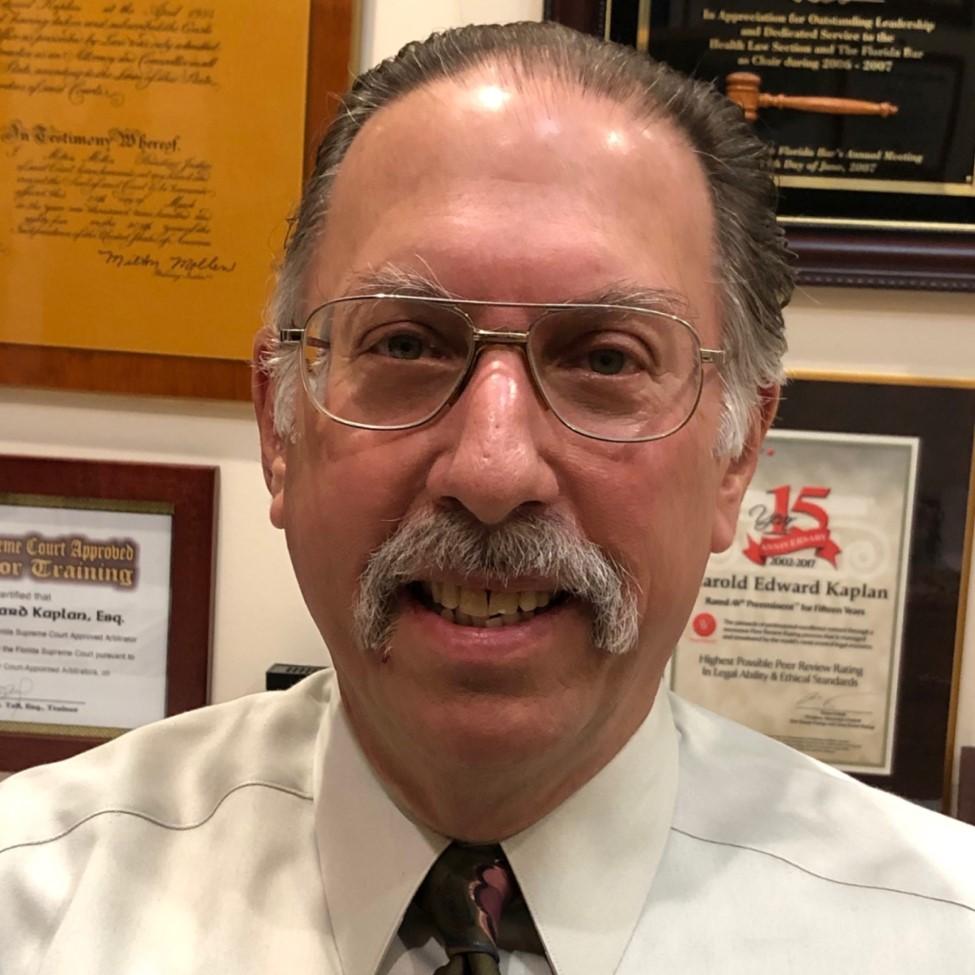
Harold E. Kaplan is a dual degree graduate of Pace University, having received his BBA in 1972 from Pace University, and his JD in 1983 from what was then known as Pace Law. After spending years in hospital administration, Harold reached out to former Pace University President Edward Mortola and began seriously considering law school. Three years later, in 1980, Harold began his law school journey and then in 1983, he graduated and was admitted to the NY Bar, prepared well by the Law School to start his career as a health law attorney. Over the years, Harold has been a generous supporter of both Pace University and the Elisabeth Haub School of Law at Pace University. Most recently, he endowed a scholarship, the Harold E. Kaplan Health Law and Policy Scholarship, to support students who are passionate about Health Law and Policy. Learn more about Harold, his time spent at Pace, his career, and more in this Q&A.
Can you tell me a bit about your background and undergraduate experience at Pace?
I grew up in Brooklyn and decided I wanted an undergraduate business degree. Although accepted to several colleges, I liked that Pace was then a small private school, so I attended what was then Pace College, from the fall 1968 to June 1972 and graduated with a BBA with concentrations in Law, Taxation and Economics.
Being a small school, among other things, I became acquainted with Pace President, Edward Mortola. He was always accessible to students and became a friend. It was the kind of student experience which endears the student to the school.
Albert Kalter, who taught all the undergraduate taxation courses, was the best professor I had, (and there were many excellent ones). Federal and state taxation are not the easiest subjects, and he was a great educator who took the time to explain what he was teaching. He taught his students how to read, interpret and understand the tax code which is not a simple task. He insisted that students come to class prepared, and you always knew where you stood with him. If you were unprepared, he asked that the student leave; this only happened once. He and I became good friends.
Importantly, most of the undergraduate courses I took required a term paper. After graduating, I attended the University of Ottawa, in Ottawa, Ontario, earning my Master of Health Administration degree. Given the many required research or term papers I wrote, I was well prepared for graduate school, which required numerous term papers, and to graduate, a research thesis.
Did you always want to be a lawyer?
I had considered it as an undergraduate student, but I also wanted to be a hospital administrator. When I received a traffic ticket in 1971, I asked for an administrative hearing in Manhattan traffic court and with a little persuading and careful reading of the New York State traffic code, and photographs of the street where the alleged offense occurred, I was found “not guilty”. The police officer who testified against me wasn’t happy. At home, my parents encouraged me to go to law school, but I still was more interested in hospital administration.
What was your path to law school and then ultimately to pursuing a law degree?
In 1974, I began my hospital administration career at a major NYC teaching hospital. I was negotiating contracts for expensive high tech medical equipment, and when reading purchase contracts, which I often did, I became interested in the law. When one of my departments had an ongoing dispute over an expensive piece of equipment, I was able to extend the warranty, arguing that the hospital hadn’t accepted the equipment because it didn’t meet the terms of the purchase agreement. At that point, I began to understand the value of having a law degree.
What made you choose Pace for your law degree?
Pace University was an excellent choice for my college degree and I always thought very highly of the school which had a growing reputation. In 1977, I spoke with President Edward Mortola about Pace Law , who urged me to apply to its new law school. Instead, I detoured to Florida to be the Assistant Administrator at a large community hospital. Shortly thereafter, I decided to go to law school and being in Florida, considered schools in Florida and NY. Applying to Pace Law made sense since I felt that it would provide an excellent legal education. Once accepted, my wife and I relocated from South Florida to Westchester County. Of course, three years earlier, Dr. Mortola strongly recommend that I attend Pace Law, and he and Professor Kalter were helpful references.
Who were some of the most memorable professors you had during your time as a law student?
There were many. Professor Philip Blank who taught legal methods and wills and estates. Professor Crockett who taught tax law. Professors Doernberg and Zeigler, who had very organized teaching methods and were both excellent educators. Professors John Humbach and Hervey Johnson were both excellent educators and Professor Joseph, who taught several commercial law courses and was always very accessible to students. Professors Ralph Stein and Bartlett as well. All of these professors were accessible, cared about their students, and left a very positive impression on me. They each had different teaching styles but as a group made being a law student more interesting, a little easier and sometimes fun.
What did you enjoy most about law school?
Considering it my occupation, I enjoyed the intellectual challenge of reading, understanding and briefing cases. I usually was at the law library when the door was unlocked in the AM which in some ways still felt like going to work. I long hand briefed every case and doing so, enjoyed sitting in class and putting check marks in my notebook, next to my notes about the key points being made by the professor about the holding, and the facts. It was a game and being a law student was actually fun.
What lessons from law school stayed with you?
Take your job seriously and do it well. Don’t automatically rely on others to get the job done if you are supposed to do it yourself. Delegate carefully.
You were a health law attorney for over thirty years, practicing mainly in Florida, what drew you to that area of law?
Being a former hospital executive, for me, it was natural to become a health lawyer, although I briefly considered taxation law which I was also interested in and was, to my understanding, equally difficult. At the first firm I worked at in New York City, we represented hospitals. When I opened my own practice in South Florida, I became an attorney for physicians, physician practices and other licensed health care professionals, since virtually all the hospitals already had representation.
During your time as a health law attorney, what did you find most rewarding and/or challenging about that practice area?
It was very rewarding to represent medical practices which had a wide range of legal issues making the day-to-day practice much more interesting and rewarding. Whether by good fortune or good lawyering, most of the matters I handled were resolved in my clients’ favor. I was also very active in the Florida Bar’s Health Law Section which was rewarding. I was often program chair and spoke at many Florida Bar CLE programs and volunteered for most of the Section’s positions, including ascending to Chair of the Section.
Currently, you provide arbitration services – how does that compare to your law practice?
I took the required Florida one week course to become a Certified Mediator and began mediating disputes. Shortly thereafter, the American Health Law Association began its ADR service, and recruited attorneys to be mediators and arbitrator. I started taking arbitration courses and stopped mediating.
Traditionally, arbitration was sought out by commercial disputants to serve as an efficient and final mechanism to resolve disputes, which today still remain key factors for choosing arbitration over traditional litigation. Arbitration is very different from practicing law, but at its core, you need to be an experienced attorney, sensitive to due process, hearing practice, etc. and most of all assume a leadership role in the arbitration case to avoid delays and make the process as effective and efficient as reasonably possible. Party’s attorneys usually prefer arbitrators with subject matter knowledge and experience to serve as arbitrators. Being an arbitrator teaches you to be very quiet about what you are hearing and reading and make carefully considered statements. With the right arbitrator, arbitration is beneficial to resolving commercial disputes.
You have always been a generous supporter of your alma mater, thank you. Recently, you endowed a scholarship, the Harold Kaplan Health Law and Policy Scholarship, to support students who are passionate about Health Law and Policy - as an alumnus, why do you feel it is important to give back?
As an undergraduate student, Pace University prepared me well for graduate school, and it didn’t take long to discover that Pace Law equally prepared me well for practicing law. Overall, the Pace community is very special to me, and I wanted to support its continuing mission, now and in the future. I also wanted to support law students who have an interest in health law and also take the opportunity to simply show my support for the Law School.
Do you have any advice for current or future law students?
I have lots of advice for current and future law students most of which can only be imparted one on one. However, future law students should have an understanding of the hard work required to excel in law school and also as a practicing attorney. Being an attorney and doing it well is not easy. Law students should enjoy learning about the law and should take sufficient time to read and understand the cases. It is stimulating to learn about how the law has evolved, and understand that once they are attorneys, they are joining a sacred profession which provides important services to their selected portion of society. Finally, become active in your bar association, and especially in your area of practice and always network.
What are some of your passions aside from the law?
I have many interests, but I still enjoy giving back. I am a volunteer attorney at Pisgah Legal Services in Asheville, NC, and helping those less fortunate and unable to afford and hire an attorney is very important to me. There is also a large group of retired volunteer attorneys in Asheville and being part of this group is very rewarding. I also frequently bike ride and play the piano. And, most importantly, my wife, my children, and grandchildren, are important to me so I dedicate time to family.
Faculty Focus: Dean Emerita and Professor Michelle Simon
After taking the LSAT’s on a whim during her senior year in college, Professor Michelle Simon found her passion in the law immediately after starting law school at Syracuse University College of Law. Having spent time clerking and in private practice after law school, she was hired as a professor in 1985 by Pace Law’s first female dean, Janet Johnson. Twenty-two years later, Professor Simon would also serve as dean of the Law School, making her the third female dean in the school’s history. During this women’s history month, learn more about one of Haub Law’s female trailblazers, Dean Emerita and Professor of Law, Michelle Simon, in this candid Q&A.
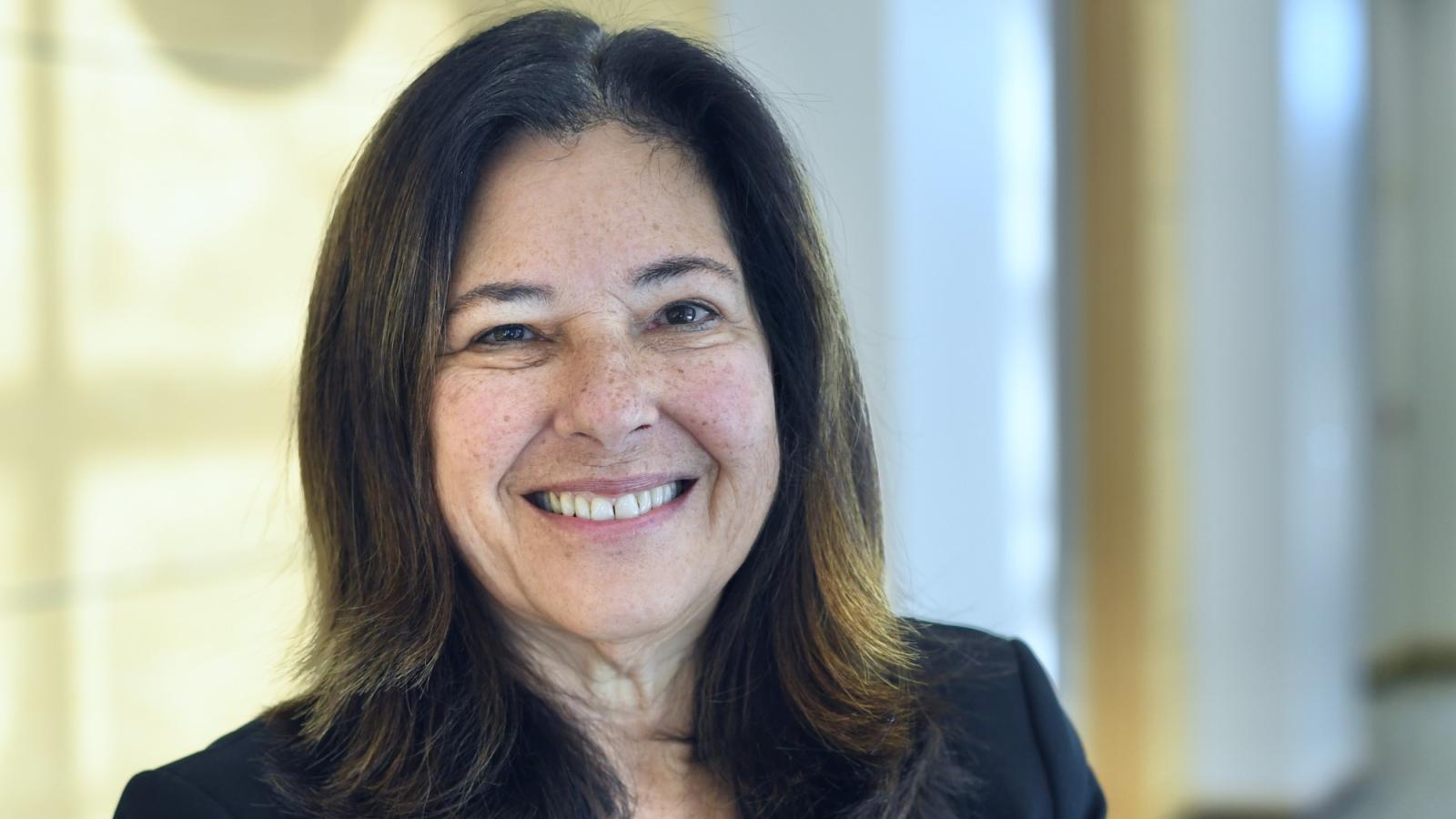
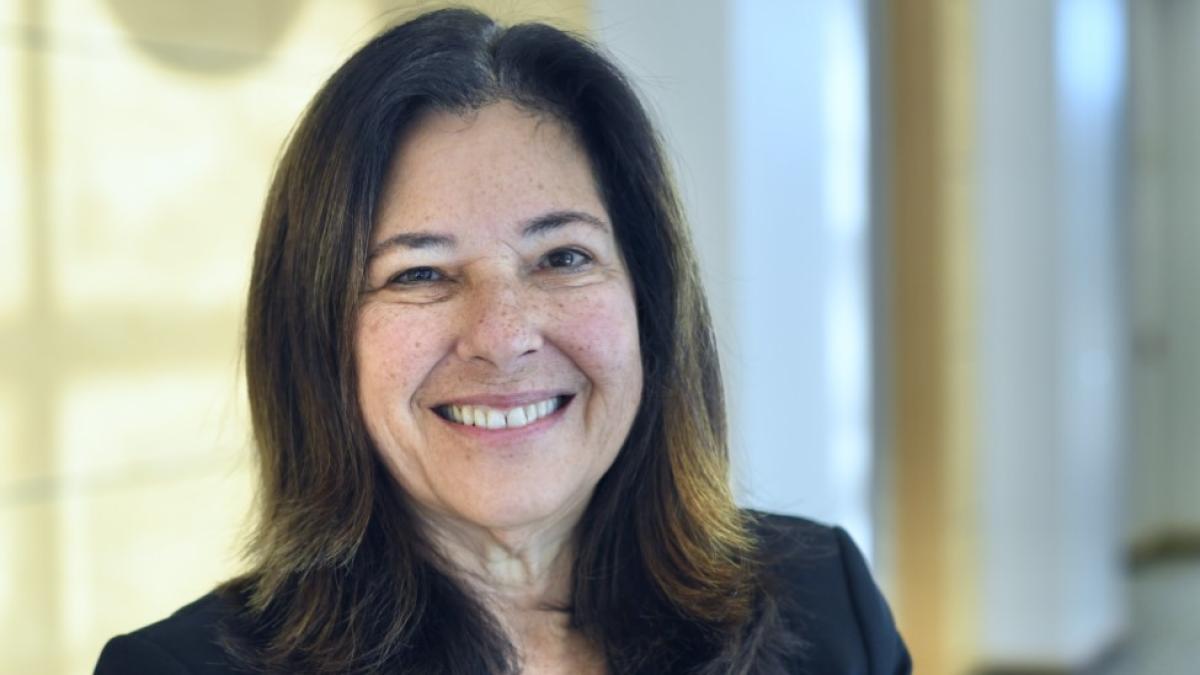
After taking the LSAT’s on a whim during her senior year in college, Professor Michelle Simon found her passion in the law immediately after starting law school at Syracuse University College of Law. Having spent time clerking and in private practice after law school, she was hired as a professor in 1985 by Pace Law’s first female dean, Janet Johnson. Twenty-two years later, Professor Simon would also serve as dean of the Law School, making her the third female dean in the school’s history. During this women’s history month, learn more about one of Haub Law’s female trailblazers, Dean Emerita and Professor of Law, Michelle Simon, in this candid Q&A.
You joined what was then known as Pace Law School in 1985 and became interim dean of the school in 2007, followed by dean of the school from 2008-2014. What was your experience like as the third female Dean of the Law School?
Dean Janet Johnson was the first female Dean and the Dean when I started at Pace in 1985. She served from 1983-1989 and was a true mentor to me. She hired me and gave me opportunities to teach different courses. In addition, Barbara Black served as an interim dean in 1993-1994 and also served as a mentor. I was very lucky as dean. At Pace, we always had many women faculty and staff, and it was a very supportive place for a woman. In addition to the support of the previous female deans at Pace, I also had the support of other female law deans. I was fortunate to have these outlets to turn to for support and advice.
Who are some of your female role models – both in and outside of the legal and academic field?
Judith Kaye, Eleanor Roosevelt, Professor Barbara Salken, and my grandmother – to name a few. Judith Kaye was the first woman named to serve on the NY Court of Appeals, and the first to serve as the Chief Judge. She focused on creating alternatives to sending defendants to jail especially for crimes involving drugs and domestic violence. She was a forward thinker and trailblazer. Eleanor Roosevelt, who was an advocate of the rights of the poor, minorities and disadvantaged, and exercised her own political and social influence. Professor Salken, a beloved professor at Pace, who died of cancer way too soon (there is a tree named after her in the courtyard). She always supported me and pushed me to become a scholar and teacher. And my grandmother, who left her life in Hungary in 1938 to escape the Nazis with her husband and my father, worked in a factory in the United States, and was one of the strongest women I ever knew. She believed in me and instilled in me that I could accomplish anything.
Although things have improved in terms of equality for men and women in the workplace, do you still feel there are roadblocks or double standards that women face?
While things are better, there are still many roadblocks. It is very difficult to juggle having a family and a legal career. While many women are entering the legal field, most managing partners and leadership positions still belong to men. I think the pandemic has helped society understand the need for more flexible working conditions, but that doesn’t impact the need to satisfy a certain number of billable hours.
How can women help empower other women in their careers and otherwise?
Be kind and supportive to each other.
Let’s step back for a moment, when did you know you wanted to be a lawyer?
I never thought about being a lawyer. My father was a professional violinist, and my mother was an art historian, so I grew up in the arts and majored in studio art and anthropology in college. I actually started a master’s degree in art therapy at Pratt Institute. When I was a senior in college, many of my friends were taking the LSAT and I decided I would too. I ended up scoring very well, and that’s when I started thinking about law school especially because I always loved both writing and researching. When I started law school, I fell in love with it and knew I had found my passion.
How did you come to join Pace as a professor?
I was always interested in law teaching, and I tried to shape my career that way by clerking, then working in private practice, and writing. I also taught as an adjunct in a paralegal program. I applied to several law schools to be a professor and had several offers, but I loved the people at Pace. It always felt like a family. I feel very fortunate to have chosen both academia and Pace, I truly think I have the best job in the world.
What is your favorite course to teach?
I love teaching civil procedure. I remember how challenging I found it to be when I was in law school, and I know that students find it difficult. I like to *try* to make it less frightening. I also love teaching torts, which is really all about analytical thinking.
You have held some prominent positions at Pace, which was the most challenging?
My time as Dean of the Law School was both my greatest challenge and my greatest achievement. It was challenging at times because you have so many constituencies—the University Trustees, the University President, the Provost, the law school faculty, law school staff, alumni, and of course the students. However, it was a very fascinating and rewarding experience as well. I had served as a trustee on a school board for 21 years and there were many similarities, but instead of thinking about what was best for all the children in my district, I was guided by what was best for all the law students at the law school.
What should students be thinking about as they enter the legal field?
I think it is important for students to think ahead about what they want their lives to look like. Your first job is not your last job, but it can be a stepping stone to the next opportunity. There has to be work-life balance, and the practice of law can be very stressful. If you are unhappy, there is nothing wrong with making a change and going in another direction. And, in whatever job you end up in, find a way to make yourself indispensable.
Aside from our mandatory first year courses, what classes would you recommend a law student should take before graduating?
It should be a mixture of courses that are tested on the bar exam (you don’t want to learn too many courses for the first time while you are studying for the bar) plus courses that look interesting to you, plus courses that are taught by a faculty member you enjoy, plus experiential courses so you get some idea about what practicing law is like. I was very surprised when I started to work about how different the practice of law was from law school.
Academically, what are you working on right now?
I am working on an article about the relationship between law students and University counseling offices and how we can better address the mental health issues in law school.
What are some of your passions and interests outside of the classroom?
I still love art. I am currently interested in honing my skills on the pottery wheel. I also have a house on Cape Cod and I love hiking, bicycling, fishing, and walking on the beach. And I have three children and so far, three grandchildren, so I love spending time with all of them.